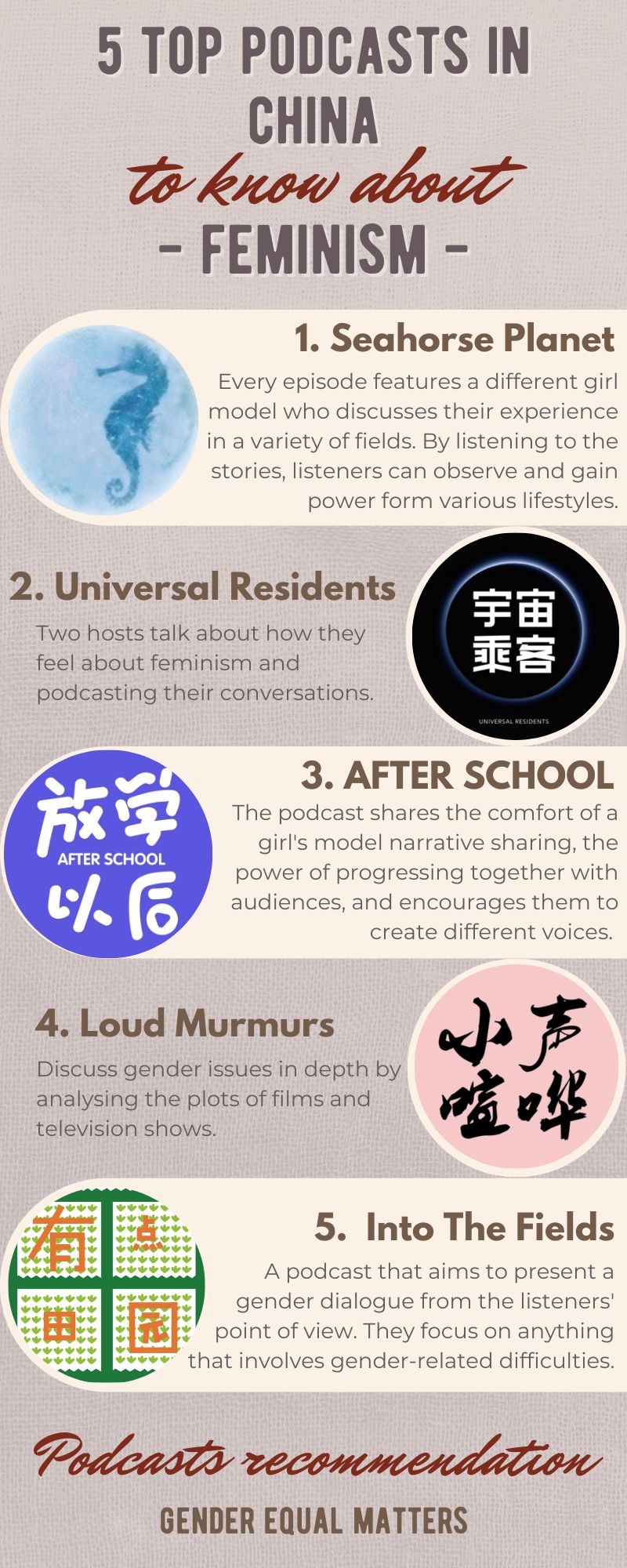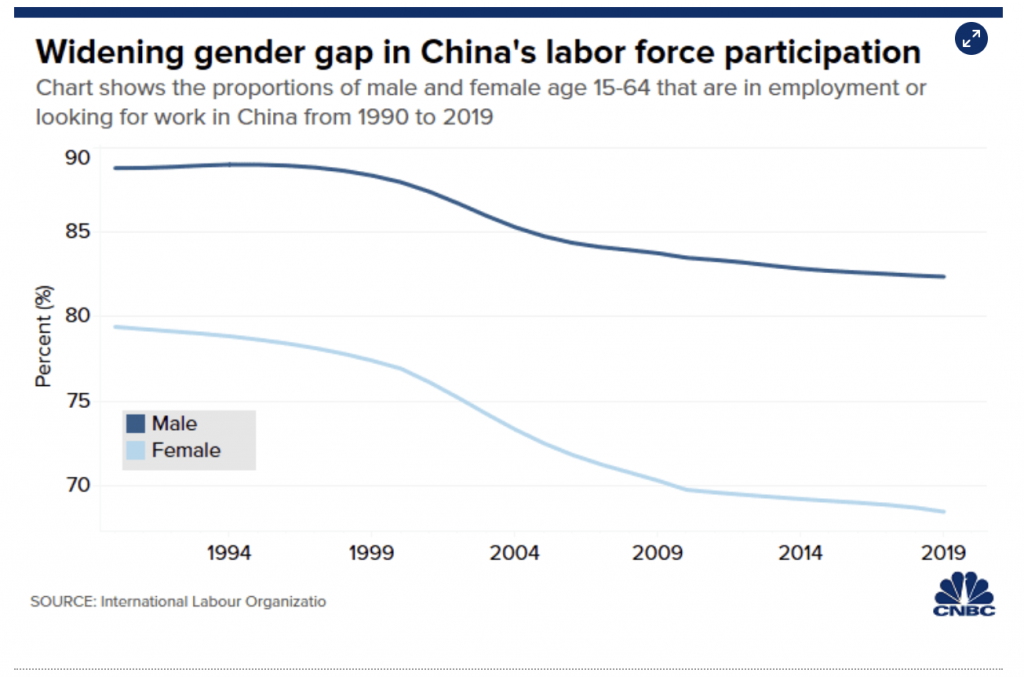One of the most difficult obstacles for many young Chinese women is balancing the competing expectations of family, society, and career success. How are a new wave of feminist podcasts in China changing the lives of a generation of young women?
As a little girl in the hot summers of northern China, Fengyi Zhai always wanted to wear shorts. She couldn’t make friends with boys in her childhood. She couldn’t laugh or make a lot of noise while she was eating with family members.
This is all because the family disciplined her in all aspects. Her mother believes the short is an indecent dress that could be attractive to a male and may bring danger to her. Her grandmother would think the vibrant behaviours are not appropriate for a lady.
I was hurt, and I couldn’t understand why I was being accused of wearing shorts in the summer when it should be normal, and why people would look at such a young girl so critically.
Fengyi Zhai
Like most Chinese girls, Fengyi grew up in a traditional family. In this kind of family, the girls had to obey family members’ indoctrination and faced all kinds of judgments. She couldn’t make any decision independently. She couldn’t say words very casually. If she said some words differently from her parents, she would get punished.
After graduating from the top university in China, Fengyi came to Oxford University to study international politics. Even though she is very excellent, gain a lot of achievements in her specialties, and is far from China, she was still under the impact of her original family. She is not confident to talk with people. When she needs to collect research materials and go out to interview unknown people, she is very shy and afraid of approaching strangers. She easily feels anxious and sensitive about many things. “Because I get very serious depression, anxiety, and complex PTSD since I was young,” Fengyi said.
By the end of 2021, her family had some serious changes which made her in deep pain. The order of her world is totally broken. Fengyi started to re-order her inner world and begin to think about who she is. She couldn’t get sleep every night and was in a terrible mental condition.
“I listened to podcasts by chance. Since I started listening to seahorse planet, my psychological condition became better,” Fengyi said, “Because I am inspired by the content. I become more self-aware and with self-awareness. I should not live under the shadow of my parents. I try to find myself and live life for myself. My overall spiritual condition has improved very much over the last six months.”
The podcast seahorse planet light Fengyi’s daily life has a lot of listeners. The host’s name is Liwen Qin. Her personal Twitter account has 12,000 followers. In the program, Liwen shares lots of female stories who are life brave and achieve life goals. She also talks a lot about the issues and challenges faced by young women in China. Many listeners were resonated and inspired by the programs. In the past, they were afraid to say their true feelings and do the desired things when they were young. “Keep silence is also a lie made by man’s world. They don’t want women to have a voice and critical thinking ability,” said Fengyi. Most listeners started to pay attention to the inequality challenges and live their lives.

Fengyi also did some research about feminism after listening to the podcast. Especially she found some patriarchal lies to control women’s thinking. She realized that keeping silent is one of the patriarchal repressions. Expressing opinions publicly is a sign of self-awareness. She researched to explore how young Chinese women with higher education view friendships among women. This is a significant improvement for her, as this represents her thinking changes, and she wants to speak and share her ideas with the young girls.
Before Fengyi became a feminist, she has a defiant attitude toward feminism. “If I believe in feminist ideas, this means that I live in a world that is full of inequalities. Which makes me feel uncomfortable and depressed. But actually, I am living in such kind of world,” she said.
According to Yue Qian, an assistant professor of sociology at the University of British Columbia, gender inequality in China has been worse recently.
China ranked 107th out of 156 nations in the World Economic Forum’s Global Gender Gap Index in 2020, dropping for the 12th year in a row. China dropped significantly after that, placing 57th on the index in 2008.
In education, most women in China are affected by gender differences as well, from Yuexuan Li, a researcher at the Singapore America School. She is investigating gender inequality in China. China’s female population has grown quickly, leading most households to decide who to spend on educational opportunities. However, families prioritise boys because they think that men are more respected in society and have a better understanding of education than women, depriving their daughters of the chance to go to school. Other Chinese households have the opinion that females do not need to have a prominent level of education to marry wealthy, intelligent boys, and lead fulfilling lives. This denies the girl’s opportunity to pursue her passion.

Gender ratios at China’s top universities continue to favour men. Peking University had a female-to-male ratio of 48 to 52 in 2018, while Tsinghua University had a lower ratio of 34 to 66.
“Before the girls were unaware that this is a gender-specific treatment, believing that they are not doing great enough, or unconfidently think they are not as clever as boys,” said Fengyi, “I have such ideas before listening to Seahorse Planet. I didn’t realise these are not my problem. These are all gender inequality cause such problems.”
When it comes to women’s career aspect, the nation’s economic development, which has spawned an intensive work ethic and “extraordinarily extended work hours,” is a contributing factor to the inequality issue, according to Qian.
Because it is expected that both men and women must work long hours and cannot take time off, the overwork culture promotes gender inequality, from Qian’s view. All these expectations hurt moms with small children in the labour market, especially in China where males are not significantly involved in childcare or housework.
From the 1950s to the 1970s, the Chinese government openly celebrated gender equality and boasted the world’s largest female workforce. However, gender inequality increased in the 1990s as China accelerated economic reforms, dismantling the Party-mandated system of equal employment for men and women.

According to the World Bank, in 1990, 73 percent of Chinese women aged 15 and older worked; by 2019, that figure had dropped to less than 61 percent.
In the family aspect, according to a study of Chinese women’s self-concept, sacrifice was a key motif in the stories of Chinese spouses. The majority of them stated that they had given up activities they enjoyed because of their family. In contrast to the individual independence mentioned by the Euro-Canadian spouses, the Chinese wives were more bound by the norms they had devised to accommodate their marriages. The majority of Chinese wives regarded themselves as less important than men. They prioritised their own wants over their husbands’ and resonated with Chinese society’s concept of men’s privileged status. They devised a set of rules to keep their spouses pleased and the family united.
Under such circumstances, some popular feminist podcasts are pointing out the inequality problems between gender. These programs are letting young girls know that this is a world for men. These podcasts enlightened the feminist consciousness of many girls.
As the awakening feminist conscious, Fengyi found that the unfair situation starts, even earlier, it starts before she was born.
When Fengyi’s mother got pregnant, they predicted and wished that Fengyi was a boy. After her mom gave birth, it was a girl, and all the family members are frustrated. Until Fengyi grew up in middle school, her father insisted to call her ‘son.’
Strong son preference in China. “Even though son-preference is not rational from the viewpoint of society as a whole, it is a rational choice for an individual,” says Professor Li Shuzhuo of Xi’an Jiaotong University’s Institute for Population and Development Studies. This is the deep roots of Chinese culture. Because the bloodline has traditionally passed through the male side. Women “marry out,” joining their husbands’ families and caring for their in-laws rather than their own parents. From the traditional son-preference view, a son was your pension for a long time, having a girl was a waste of time.
The consequences of a skewed sex ratio at birth have had far-reaching societal and individual consequences, including a marriage squeeze caused by gender disparities at prime marriage ages – more men in the marriage market than potential female partners, a large gender population gap, discrimination, and violence against women, violations of women’s and girls’ rights, due to a research data.
“It is very important for women to be educated in feminism, to be self-aware, to want to pursue themselves, and to be able to develop into a better person with less attachment to their family, opening up a wide range of possibilities in their lives,” Fengyi said.
Seahorse Planet is talking about the repressed and neglected gender issues in life, which all resonate with the audience. The show goes deeper to explain why some of life’s unique female dilemmas are encountered, offering some ideas for solutions for the many troubled girls in their position. Rather than over-reflecting on themselves, women need to be aware of these gender issues and use some behaviour to fight against the injustices that arise in society.
“Young girls are still at a stage where their thinking can be easily changed and they are also at a stage of life transition when they are growing out of their patriarchal family, moving into society, and really becoming mature and independent individuals,” Fengyi said.
“More aware of how to defend their interests and compete with men. I am also looking forward to the changes that our young women, who have grown up under the influence of a feminist climate, will be able to bring about when they become the dominant figures in society,” Fengyi said.
